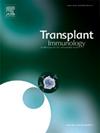PD-1抑制剂用于实体器官和骨髓移植患者的皮肤恶性肿瘤:移植排斥反应,治疗反应和生存
IF 1.4
4区 医学
Q4 IMMUNOLOGY
引用次数: 0
摘要
实体器官移植受者患侵袭性皮肤癌的风险明显增加。程序性细胞死亡蛋白-1 (PD-1)抑制剂可以显著改善晚期黑色素瘤、鳞状细胞癌(SCC)和默克尔细胞癌(MCC)的预后,但它们在移植患者中的应用受到移植物排斥反应风险的限制。这一人群的数据仍然很少。目的评价PD-1抑制剂治疗晚期皮肤恶性肿瘤患者的移植排斥反应率、治疗反应和生存率。方法对16例实体器官移植患者(肾14例,肝2例)和5例异体骨髓移植患者进行分析。皮肤癌类型包括14种鳞状细胞癌、2种黑色素瘤和5种默克尔细胞癌。结果16例实体器官移植受者(肾14例,肝2例)中,4例发生排斥反应。其中三例发生在PD-1启动之前,仅留下一例可归因于治疗的排斥反应。PD-1启动后的中位生存期(8.3个月)比死于癌症进展的患者(3.0个月)更长。骨髓移植受者没有出现排斥反应。结论和相关性在我们的数据中(迄今为止报道的最大队列),大多数移植受者耐受PD-1抑制剂而无移植排斥反应。尽管排斥反应仍然存在严重的风险,但这些发现表明,PD-1免疫疗法可能被认为是精心挑选的晚期皮肤癌患者的救助性选择。本文章由计算机程序翻译,如有差异,请以英文原文为准。
PD-1 inhibitor use for skin malignancies in patients with solid organ and bone marrow transplants: Graft rejection, treatment responses, and survival
Importance
Solid organ transplant recipients face a markedly increased risk of aggressive skin cancers. Programmed cell death protein-1 (PD-1) inhibitors have significantly improved outcomes for advanced melanoma, squamous cell carcinoma (SCC), and Merkel cell carcinoma (MCC), but their use in transplant patients is limited by the risk of graft rejection. Data in this population remain scarce.
Objective
To evaluate rates of graft rejection, treatment responses, and survival among transplant recipients treated with PD-1 inhibitors for advanced skin malignancies.
Methods
We identified 16 solid organ transplants patients (14 kidney, 2 liver) and 5 allogeneic bone marrow transplant patients. Skin cancer types included 14 squamous cell carcinomas, 2 melanomas, and 5 Merkel cell carcinomas.
Results
Among 16 solid organ transplant recipients (14 kidney, 2 liver), 4 developed graft rejection. Three occurred prior to PD-1 initiation, leaving only one rejection attributable to therapy. Median survival following PD-1 initiation was longer in patients with rejection (8.3 months) compared with those who died of cancer progression (3.0 months). No bone marrow transplant recipients experienced rejection.
Conclusions and relevance
In our data (the largest reported cohort to date), most transplant recipients tolerated PD-1 inhibitors without graft rejection. Although rejection remains a serious risk, these findings suggest that PD-1 immunotherapy may be considered as a salvage option for carefully selected patients with advanced skin cancer.
求助全文
通过发布文献求助,成功后即可免费获取论文全文。
去求助
来源期刊

Transplant immunology
医学-免疫学
CiteScore
2.10
自引率
13.30%
发文量
198
审稿时长
48 days
期刊介绍:
Transplant Immunology will publish up-to-date information on all aspects of the broad field it encompasses. The journal will be directed at (basic) scientists, tissue typers, transplant physicians and surgeons, and research and data on all immunological aspects of organ-, tissue- and (haematopoietic) stem cell transplantation are of potential interest to the readers of Transplant Immunology. Original papers, Review articles and Hypotheses will be considered for publication and submitted manuscripts will be rapidly peer-reviewed and published. They will be judged on the basis of scientific merit, originality, timeliness and quality.
 求助内容:
求助内容: 应助结果提醒方式:
应助结果提醒方式:


